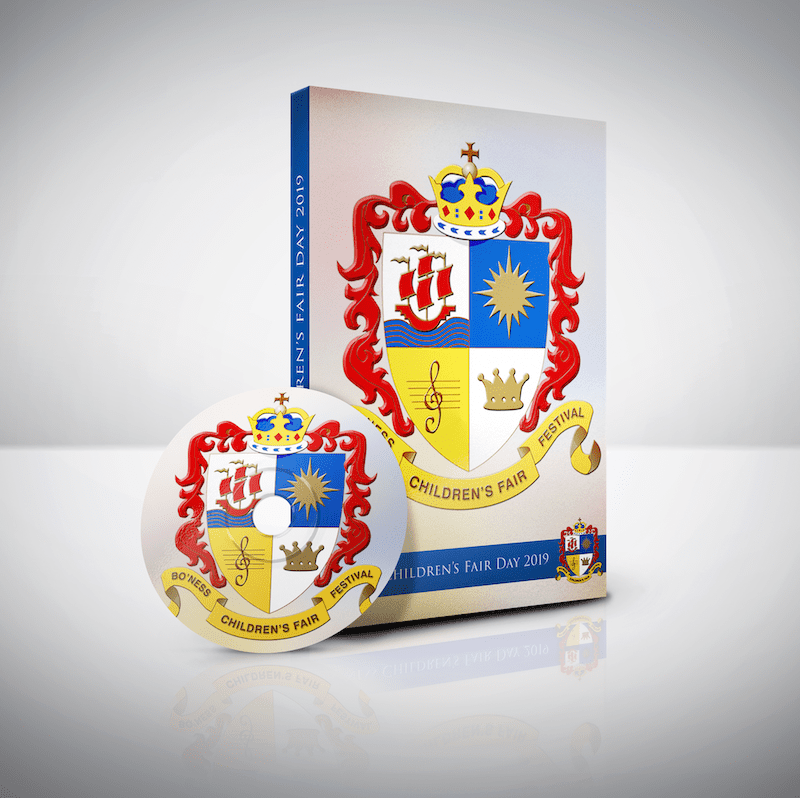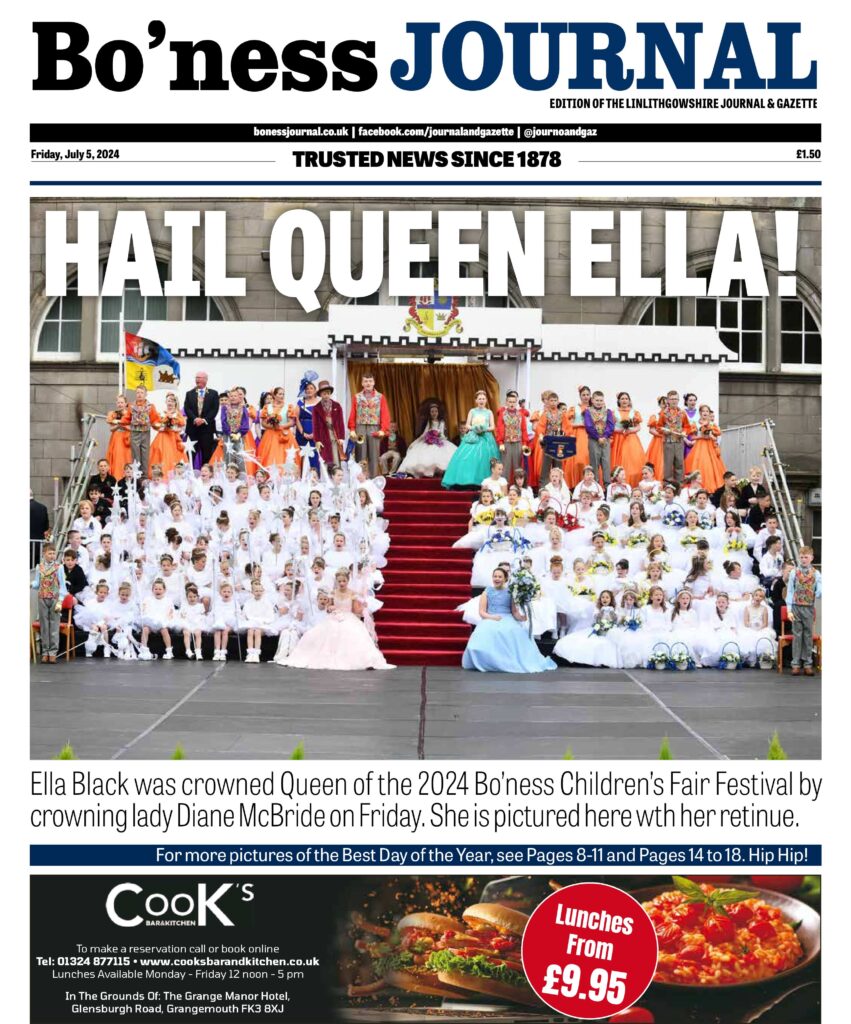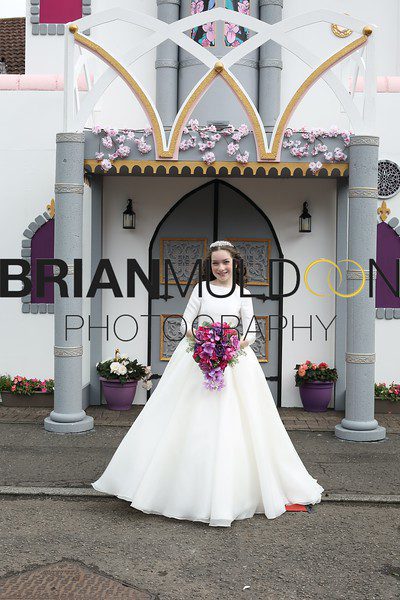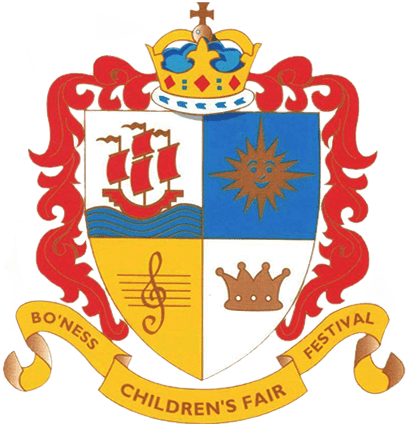THERE is no use denying it – anyway someone would tell on me if I did – but there was a time when I was weary of The Bo’ness Fair. I was, in short, a wayward child who had strayed from the path of righteousness. A disgruntled adolescent ( and a plooky one ) who at the age of 15, was determined not to enjoy anything that young children or adults celebrated; Christmas, Easter, holidaying with my parents in Arbroath, the music of Mantovani but most misguided of all, The Bo’ness Children’s Fair Festival. As one of my learned Livingstone relatives intoned, “a man who tired of the Fair is tired of life itself.” But it was not always thus…
” Tarara-rarara-rarara-ra-ra-rara-ra-ra-ra-ra-2-3-4-5-6-7-8-huge breath . . .” to an outsider, the above jumble of letters and numbers would be incomprehensible, a code that even Bletchly Park couldn’t crack with their Enigma machines; but to the cultured Bo’nessian it is Our Tune – sung in many far-off climes, wherever two or more of Bo’nessians loiter; from Nigeria to Norway, from France – to even Fife. . . ” See the summer sun is gleaming. . .” in my childhood, it always did on The Fair Day in June. Of course there are those who will accuse us of being sentimental romantics, but then they won’t have felt the power of the Bo’ness Fair Day and how it transforms a town into a community.
There is no doubt the Fair Day is unique and special: its influence extending far beyond the big day in June. For the first time last summer, Bo’ness Academy had a school Prom – a splendid occasion where our town’s senior pupils, dressed in their ball gowns and kilts, marked the end of their schooling, before heading off to further education or work, it was an excellent example of all that is good about the youth of Bo’ness. But more than that, it also revealed just how crucial the Fair Day still is in their lives. The last piece of music of the night was, not a smoochie number for the ritualistic, barnacle-dance whereby couples cling like limpets to one another, not even the worthy Auld Lang Syne; but that other song of camaraderie unique to Bo’ness. . . The Bo’ness Fair Song. It was quite an emotional moment – and I hope the start of a new tradition for the Academy.
But why did the whole room burst into life and the dance-floor fill with every single Bo’ness boy and girl – something that had not been achieved by any other piece of music that night? Simply, because of what it meant to these youngsters who were about to embark on a new life, many of them outside our community; it reminded them of what a childhood in Bo’ness means – the celebration of what it is to be a child.
Those with this sense of community are indeed lucky to have experienced a Bo’ness childhood. In exile , I have brought my children to the Fair. My daughter marvels at the Queen of the Fairies’ fragile beauty; my son looks and listens longingly at the Champion’s sword and feisty words and wishes they were his. And when it is all over and we are driving back to our nice, new city Stirling, they lambaste their fond father for being so foolish as to live outside of a place that makes magic happen once a year.
And I too was part of that magic. As a young child at Bo’ness Public School in Mrs Turnbull’s Primary One Class, John Boyd and I had greatness thrust upon us – we were appointed page boys to Queen Shirley. I remember the frantic preparations, a white satin suit with a red bow tie with white gloves. I remember too a golden posterior – nothing to do with nerves – but a newly spray-painted chair not quite dry at rehearsals made sure nothing was left to chance and of course there was the arches.
In garages and workshops all over Bo’ness, the sounds of sawing and rasping, hammering and frustration can be heard, whilst worried fathers, uncles, friends, neighbours and anyone else who is able bodied, plan, and build modest and gargantuan feats of genius outside front doors, over gates, or even across roads. My arch ( or was it a house frontage? I’ll check with Mr Pollock ) was modest in construction but lovingly put together and later cherished in the back garden until the damp wood separated and the “earywigs” became too numerous to bear.
I remember too a second Fair Medal as a Tyrolean Dancer, complete with lederhosen, bells nad bruised thighs, twirling Claire Jeffreys round the town in the Fair Procession, whilst Alistair Moore Championed Jean Dewar’s honour. I’m almost ashamed to say that I got a third medal, when there were those whose families were sadly missed out of the dressmaking and arch-building ritual. As undercover Public School boys, Alistair Paterson and I played on stage and marched round the town with Deanburn School Band under the energetic leadership of Jim Valance whilst secretly singing along to “2, 4, 6, 8, who do we appreciate. . . The Public!”
As an ex-Public Schoolboy, no longer incognito, it is a privilege to be writing this article, when this year the Public School will provide the Royal Retinue for 2002. It is also a delight to know that one of the members of staff of The Public School and latterly the Academy, will crown the Queen – Mrs Cullen or Margaret Begg to her elders. Like Margaret’s, my connections with the public school run back into the past. It was the school my Father attended as a young boy, albeit briefly, the school my Aunt Grace Livingstone and my Mother, Karen Darge, taught in – a job which she loved.
Indeed, it was while still a teacher, that my Mother was bestowed with one of the greatest honours a woman could receive in Bo’ness – she crowned Kirsty Lockwood Queen. Being born and bred in a small village in Norway, I think she may have been the first foreigner to carry out this prestigious task. Indeed Bo’ness Fair is internationalist in its outlook – it is not just about our town as we have welcomed school bands from Norway for many. Some of you may remember two Norwegian Bo’nessians, Ruth McIntosh and my Mother, striding out in front of them, proudly wearing their national costumes. For the past few years we have also been host to a South African School as well as the incredible array of Pipe and Brass Bands from all round the globe – including Linlithgow.
Sometimes to really find out what a place is like, you need to discover a different perspective from outside the picture. As a moody teenager, my perspective was distorted, skewed. But my return to Bo’ness as a teacher has changed my view – I now see Bo’ness as I once saw it as a child, as a magical place. Having lived in many other cities and towns in Scotland, I know Bo’ness is an extraordinary town. It is a place where magic does happen; where for just one day in the year, adult’s lives are of no importance and children literally and metaphorically take centre stage. It is where a community celebrates what, after all, is our future, our town’s youth.
OLAV DARGE





